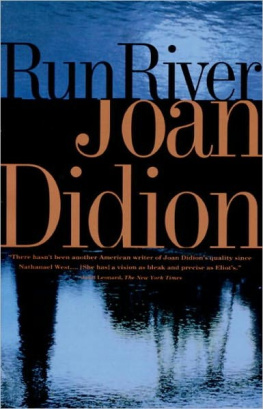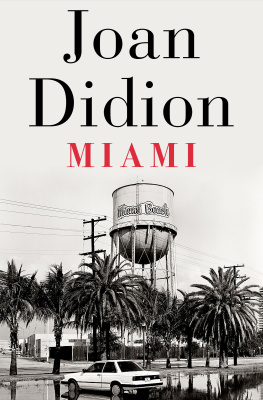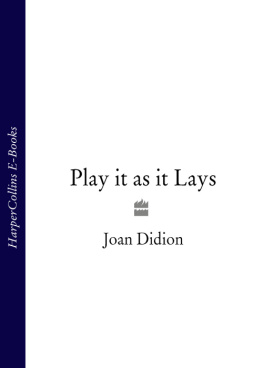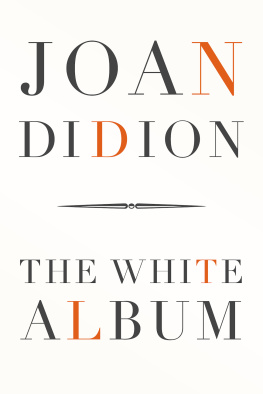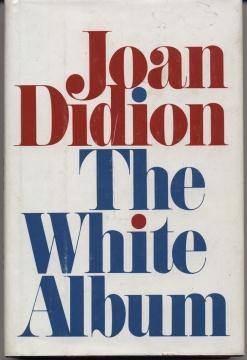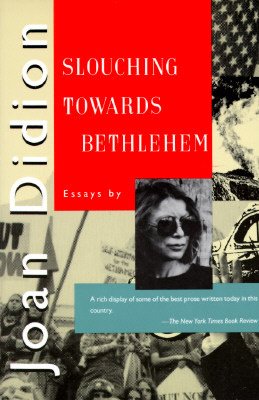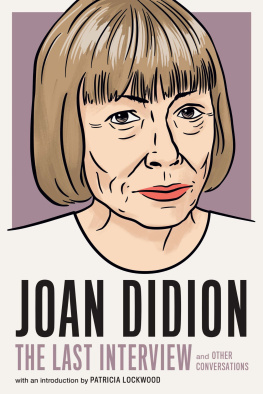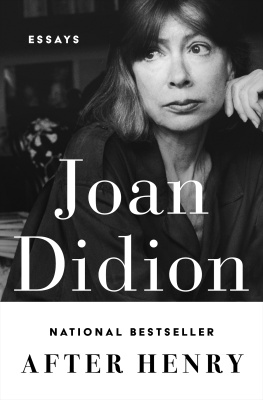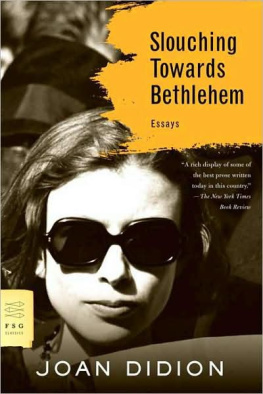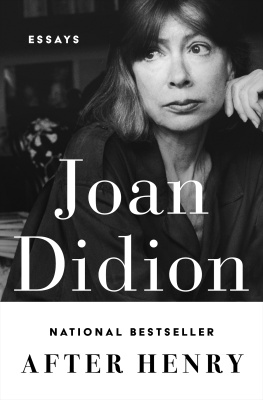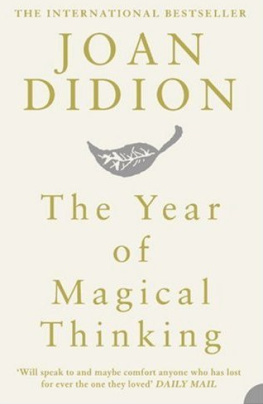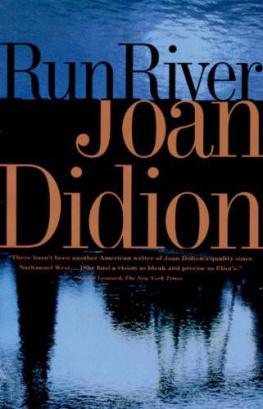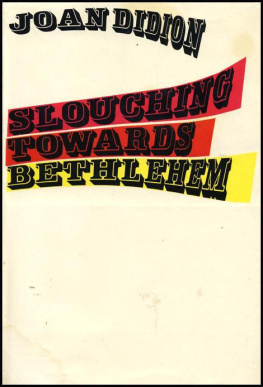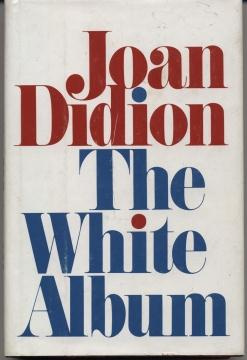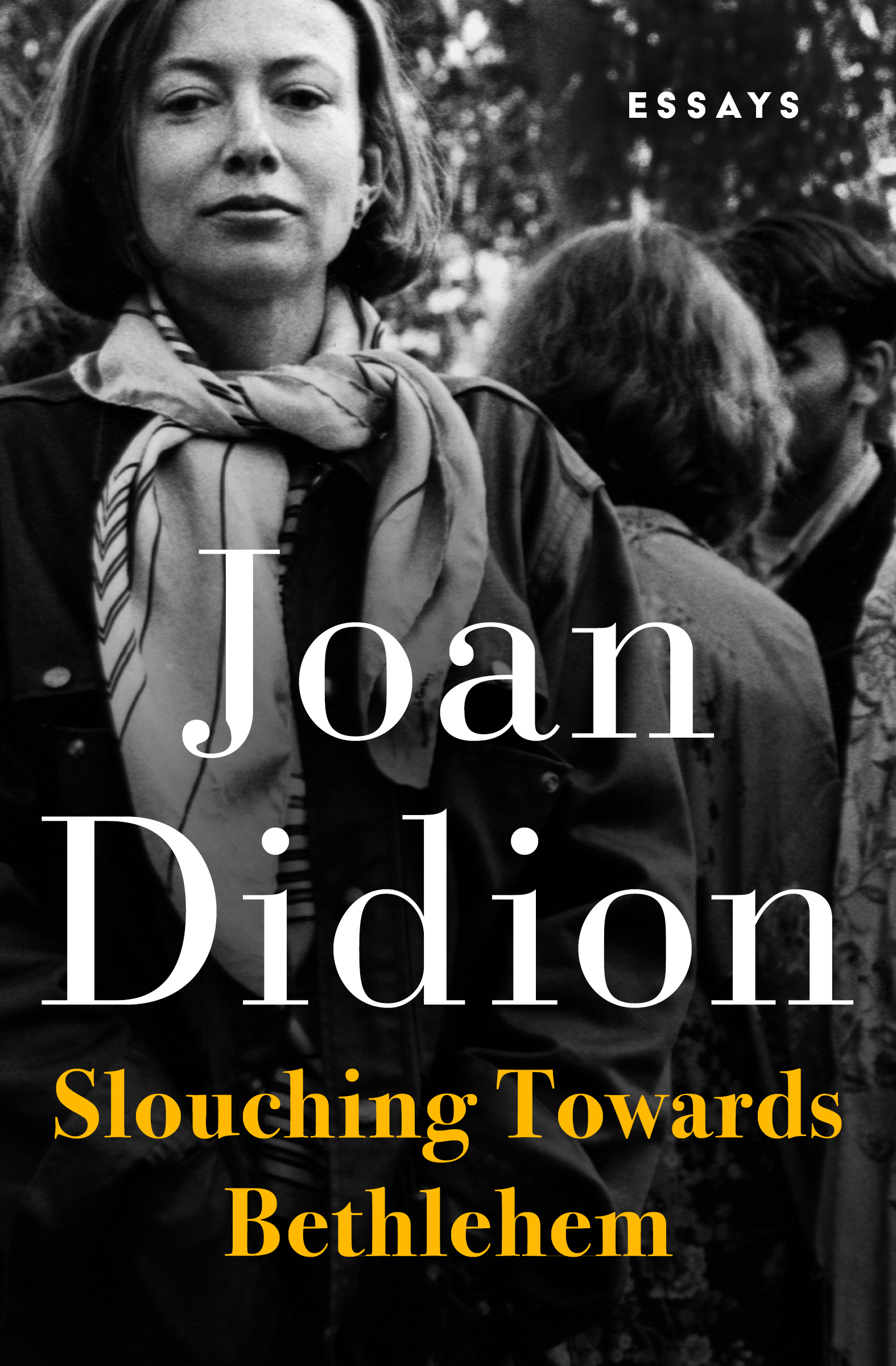SLOUCHING
TOWARDS
BETHLEHEM
Joan Didion

for quintana
Acknowledgments
Where the Kissing Never Stops appeared first in The New York Times Magazine under the title Just Folks at a School for Non-Violence. On Keeping a Notebook and Notes from a Native Daughter appeared first in Holiday. I Cant Get That Monster out of My Mind and On Morality first appeared in The American Scholar, the latter under the title The Insidious Ethic of Conscience. On Self-Respect and Guaymas, Sonora appeared first in Vogue. Los Angeles Notebook includes a section which was published as The Santa Ana in The Saturday Evening Post. All the other essays appeared originally in The Saturday Evening Post, several under different titles: Some Dreamers of the Golden Dream was published as How Can I Tell Them Theres Nothing Left; 7000 Romaine, Los Angeles 38, was published as The Howard Hughes Underground; Letter from Paradise, 21 19 N., 157 52 W. was called Hawaii: Taps Over Pearl Harbor; Goodbye to All That was called Farewell to the Enchanted City.
The author is grateful to all these publications for permission to reprint the various essays.
Turning and turning in the widening gyre
The falcon cannot hear the falconer;
Things fall apart; the center cannot hold;
Mere anarchy is loosed upon the world,
The blood-dimmed tide is loosed, and everywhere
The ceremony of innocence is drowned;
The best lack all conviction, while the worst
Are full of passionate intensity.
Surely some revelation is at hand;
Surely the Second Coming is at hand.
The Second Coming! Hardly are those words out
When a vast image out of Spiritus Mundi
Troubles my sight: somewhere in the sands of the desert
A shape with lion body and the head of a man,
A gaze blank and pitiless as the sun,
Is moving its slow thighs, while all about it
Reel shadows of the indignant desert birds.
The darkness drops again; but now I know
That twenty centuries of stony sleep
Were vexed to nightmare by a rocking cradle,
And what rough beast, its hour come round at last,
Slouches towards Bethlehem to be born?
W. B. Yeats
I learned courage from Buddha, Jesus, Lincoln, Einstein, and Cary Grant.
Miss Peggy Lee
A Preface:
This book is called Slouching Towards Bethlehem because for several years now certain lines from the Yeats poem which appears two pages back have reverberated in my inner ear as if they were surgically implanted there. The widening gyre, the falcon which does not hear the falconer, the gaze blank and pitiless as the sun; those have been my points of reference, the only images against which much of what I was seeing and hearing and thinking seemed to make any pattern. Slouching Towards Bethlehem is also the title of one piece in the book, and that piece, which derived from some time spent in the Haight-Ashbury district of San Francisco, was for me both the most imperative of all these pieces to write and the only one that made me despondent after it was printed. It was the first time I had dealt directly and flatly with the evidence of atomization, the proof that things fall apart: I went to San Francisco because I had not been able to work in some months, had been paralyzed by the conviction that writing was an irrelevant act, that the world as I had understood it no longer existed. If I was to work again at all, it would be necessary for me to come to terms with disorder. That was why the piece was important to me. And after it was printed I saw that, however directly and flatly I thought I had said it, I had failed to get through to many of the people who read and even liked the piece, failed to suggest that I was talking about something more general than a handful of children wearing mandalas on their foreheads. Disc jockeys telephoned my house and wanted to discuss (on the air) the incidence of filth in the Haight-Ashbury, and acquaintances congratulated me on having finished the piece just in time, because the whole fads dead now, fini, kaput. I suppose almost everyone who writes is afflicted some of the time by the suspicion that nobody out there is listening, but it seemed to me then (perhaps because the piece was important to me) that I had never gotten a feedback so universally beside the point.
Almost all of the pieces here were written for magazines during 1965, 1966, and 1967, and most of them, to get that question out of the way at the outset, were my idea. I was asked to go up to the Carmel Valley and report on Joan Baezs school there; I was asked to go to Hawaii; I think I was asked to write about John Wayne; and I was asked for the short essays on morality, by The American Scholar, and on self-respect, by Vogue. Thirteen of the twenty pieces were published in The Saturday Evening Post. Quite often people write me from places like Toronto and want to know (demand to know) how I can reconcile my conscience with writing for The Saturday Evening Post; the answer is quite simple. The Post is extremely receptive to what the writer wants to do, pays enough for him to be able to do it right, and is meticulous about not changing copy. I lose a nicety of inflection now and then to the Post, but do not count myself compromised. Of course not all of the pieces in this book have to do, in a subject sense, with the general breakup, with things falling apart; that is a large and rather presumptuous notion, and many of these pieces are small and personal. But since I am neither a camera eye nor much given to writing pieces which do not interest me, whatever I do write reflects, sometimes gratuitously, how I feel.
I am not sure what more I could tell you about these pieces. I could tell you that I liked doing some of them more than others, but that all of them were hard for me to do, and took more time than perhaps they were worth; that there is always a point in the writing of a piece when I sit in a room literally papered with false starts and cannot put one word after another and imagine that I have suffered a small stroke, leaving me apparently undamaged but actually aphasic. I was in fact as sick as I have ever been when I was writing Slouching Towards Bethlehem; the pain kept me awake at night and so for twenty and twenty-one hours a day I drank gin-and-hot-water to blunt the pain and took Dexedrine to blunt the gin and wrote the piece. (I would like you to believe that I kept working out of some real professionalism, to meet the deadline, but that would not be entirely true; I did have a deadline, but it was also a troubled time, and working did to the trouble what gin did to the pain.) What else is there to tell? I am bad at interviewing people. I avoid situations in which I have to talk to anyones press agent. (This precludes doing pieces on most actors, a bonus in itself.) I do not like to make telephone calls, and would not like to count the mornings I have sat on some Best Western motel bed somewhere and tried to force myself to put through the call to the assistant district attorney. My only advantage as a reporter is that I am so physically small, so temperamentally unobtrusive, and so neurotically inarticulate that people tend to forget that my presence runs counter to their best interests. And it always does. That is one last thing to remember: writers are always selling somebody out.
Contents
I
LIFE STYLES IN THE
GOLDEN LAND
Some Dreamers of the Golden Dream
T his is a story about love and death in the golden land, and begins with the country. The San Bernardino Valley lies only an hour east of Los Angeles by the San Bernardino Freeway but is in certain ways an alien place: not the coastal California of the subtropical twilights and the soft westerlies off the Pacific but a harsher California, haunted by the Mojave just beyond the mountains, devastated by the hot dry Santa Ana wind that comes down through the passes at 100 miles an hour and whines through the eucalyptus windbreaks and works on the nerves. October is the bad month for the wind, the month when breathing is difficult and the hills blaze up spontaneously. There has been no rain since April. Every voice seems a scream. It is the season of suicide and divorce and prickly dread, wherever the wind blows.


